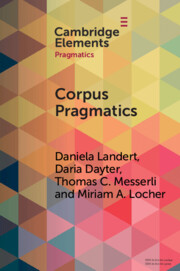In der letzten Zeit sind u.a. diese frei verfügbaren Titel erschienen:
Brückenschläge: Linguistik an den Schnittstellen
Sarah Brommer, Kersten Sven Roth, Jürgen Spitzmüller (Hrsg.)
https://doi.org/10.24053/9783823395188
Der Sammelband regt an, über den Tellerrand der Linguistik hinauszuschauen, dorthin zu gehen, wo sich die (Sub)Disziplinen nicht mehr zuständig fühlen, und dabei die Gegenstände, Zugänge sowie Handlungsräume neu zu betrachten. Die Beiträge leuchten die Schnittstellen zwischen den institutionell verfestigten Disziplinen aus und diskutieren, wo sinnvolle Grenzüberschreitungen und Brückenschläge nötig sind, um starre „Denkstile“ (Ludwik Fleck) aufzubrechen, disziplinäre Gewissheiten zu hinterfragen und mögliche neue Gegenstandsbestimmungen vorzunehmen.
Corpus Pragmatics
Daniela Landert, Daria Dayter, Thomas C. Messerli, Miriam A. Locher (Hrsg.)
https://doi.org/10.1017/9781009091107
This Element discusses the challenges and opportunities that different types of corpora offer for the study of pragmatic phenomena. The focus lies on a hands-on approach to methods and data that provides orientation for methodological decisions. In addition, the Element identifies areas in which new methodological developments are needed in order to make new types of data accessible for pragmatic research. Linguistic corpora are currently undergoing diversification. While one trend is to move towards increasingly large corpora, another trend is to enhance corpora with more specialised and layered annotation. Both these trends offer new challenges and opportunities for the study of pragmatics. This volume provides a practical overview of state-of-the-art corpus-pragmatic methods in relation to different types of corpus data, covering established methods as well as innovative approaches. This title is also available as Open Access on Cambridge Core.
Valency over Time: Diachronic Perspectives on Valency Patterns and Valency Orientation
Silvia Luraghi & Elisa Roma (Hrsg.)
https://doi.org/10.1515/9783110755657
Valency patterns and valency orientation have been frequent topics of research under different perspectives, often poorly connected. Diachronic studies on these topics is even less systematic than synchronic ones. The papers in this book bring together two strands of research on valency, i.e. the description of valency patterns as worked out in the Leipzig Valency Classes Project (ValPaL), and the assessment of a language’s basic valency and its possible orientation. Notably, the ValPaL does not provide diachronic information concerning the valency patterns investigated: one of the aims of the book is to supplement the available data with data from historical stages of languages, in order to make it profitably exploitable for diachronic research. In addition, new research on the diachrony of basic valency and valency alternations can deepen our understanding of mechanisms of language change and of the propensity of languages or language families to exploit different constructional patterns related to transitivity.


